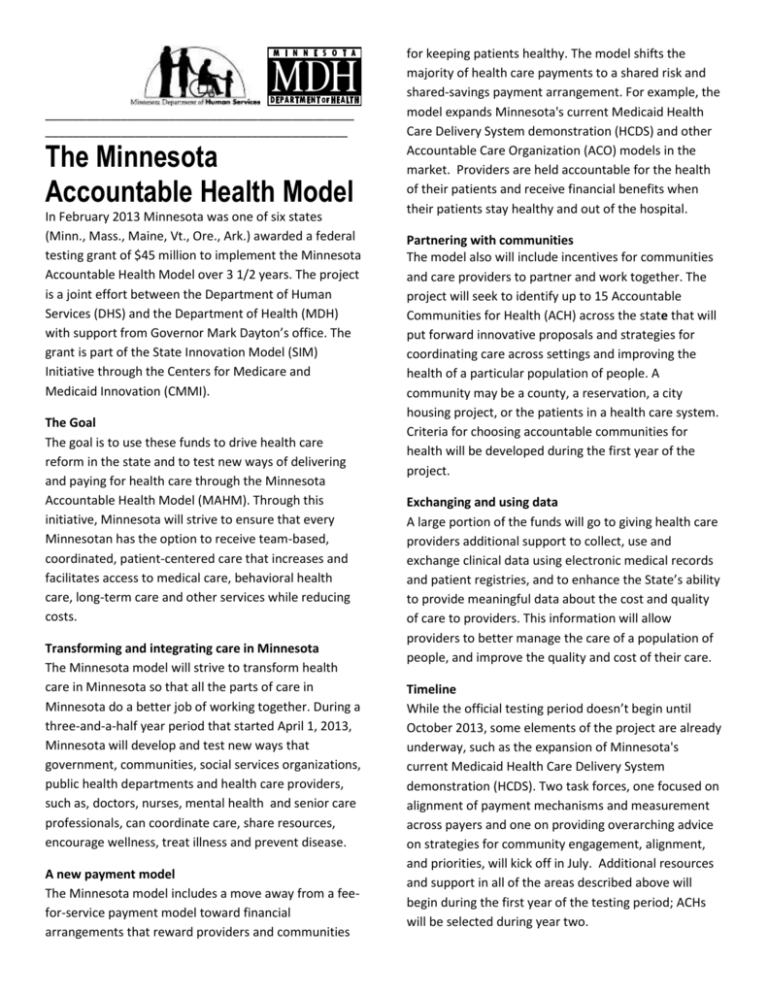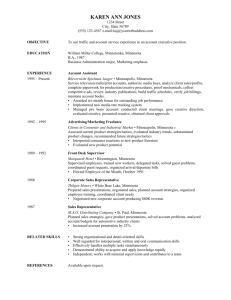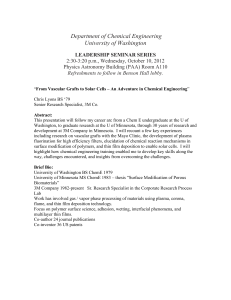SIM One-pager - Minnesota Public Health Association
advertisement

_____________________________________________ ____________________________________________ The Minnesota Accountable Health Model In February 2013 Minnesota was one of six states (Minn., Mass., Maine, Vt., Ore., Ark.) awarded a federal testing grant of $45 million to implement the Minnesota Accountable Health Model over 3 1/2 years. The project is a joint effort between the Department of Human Services (DHS) and the Department of Health (MDH) with support from Governor Mark Dayton’s office. The grant is part of the State Innovation Model (SIM) Initiative through the Centers for Medicare and Medicaid Innovation (CMMI). The Goal The goal is to use these funds to drive health care reform in the state and to test new ways of delivering and paying for health care through the Minnesota Accountable Health Model (MAHM). Through this initiative, Minnesota will strive to ensure that every Minnesotan has the option to receive team-based, coordinated, patient-centered care that increases and facilitates access to medical care, behavioral health care, long-term care and other services while reducing costs. Transforming and integrating care in Minnesota The Minnesota model will strive to transform health care in Minnesota so that all the parts of care in Minnesota do a better job of working together. During a three-and-a-half year period that started April 1, 2013, Minnesota will develop and test new ways that government, communities, social services organizations, public health departments and health care providers, such as, doctors, nurses, mental health and senior care professionals, can coordinate care, share resources, encourage wellness, treat illness and prevent disease. A new payment model The Minnesota model includes a move away from a feefor-service payment model toward financial arrangements that reward providers and communities for keeping patients healthy. The model shifts the majority of health care payments to a shared risk and shared-savings payment arrangement. For example, the model expands Minnesota's current Medicaid Health Care Delivery System demonstration (HCDS) and other Accountable Care Organization (ACO) models in the market. Providers are held accountable for the health of their patients and receive financial benefits when their patients stay healthy and out of the hospital. Partnering with communities The model also will include incentives for communities and care providers to partner and work together. The project will seek to identify up to 15 Accountable Communities for Health (ACH) across the state that will put forward innovative proposals and strategies for coordinating care across settings and improving the health of a particular population of people. A community may be a county, a reservation, a city housing project, or the patients in a health care system. Criteria for choosing accountable communities for health will be developed during the first year of the project. Exchanging and using data A large portion of the funds will go to giving health care providers additional support to collect, use and exchange clinical data using electronic medical records and patient registries, and to enhance the State’s ability to provide meaningful data about the cost and quality of care to providers. This information will allow providers to better manage the care of a population of people, and improve the quality and cost of their care. Timeline While the official testing period doesn’t begin until October 2013, some elements of the project are already underway, such as the expansion of Minnesota's current Medicaid Health Care Delivery System demonstration (HCDS). Two task forces, one focused on alignment of payment mechanisms and measurement across payers and one on providing overarching advice on strategies for community engagement, alignment, and priorities, will kick off in July. Additional resources and support in all of the areas described above will begin during the first year of the testing period; ACHs will be selected during year two.




